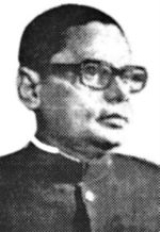
Abu Sayeed Chowdhury
Encyclopedia
Abu Sayeed Chowdhury was a jurist and the President of Bangladesh
. Abu Sayeed Choudhury was born on January 05, 1921 in a Zamindar family of Nagbari in Tangail District
. His father Abdul Hamid Choudhury later became the speaker of the East Pakistan Provincial Assembly.
In 1960, he was appointed as advocate general of East Pakistan.He was elevated to the post of Additional Judge of the Dhaka High Court on 7th July 1961 by the then President of Pakistan Field Marshal Mohammad Ayub Khan and was confirmed as Judge of the Dhaka High Court after two years. He had been a member of the Constitution Commission (1960-61) and chairman of the Bengali Development Board (1963-1968). Justice Chowdhury was appointed as vice-chancellor of Dhaka University in 1969. In 1971, while in Geneva he resigned from his post as vice-chancellor as a protest against the genocide in East Pakistan by the Pakistan army. From Geneva he went to the UK and became the special envoy of the provisional 'Mujibnagar' government. An umbrella organization, 'The Council for the People's Republic of Bangladesh in UK' was formed on 24 April 1971 in Coventry, UK, by the expatriate Bengali's, and a five member Steering Committee (central committee) of the Council was elected by them.
|-
President of Bangladesh
Since 1991, the President of Bangladesh is the head of state, a largely ceremonial post elected by the parliament. Since 1996, the President's role becomes more important after the term of the government has finished, when his executive authority is enhanced as laid down in the constitution of the...
. Abu Sayeed Choudhury was born on January 05, 1921 in a Zamindar family of Nagbari in Tangail District
Tangail District
Tangail is a district in central region of Bangladesh. It is a part of the Dhaka division. The population of Tangail zilla is about 3.2 million and its surface area is 3,414.39 km². The main town of Tangail District is the district town Tangail...
. His father Abdul Hamid Choudhury later became the speaker of the East Pakistan Provincial Assembly.
Professional Career
Abu Sayeed Chowdhury was a practising Advocate of Dhaka High Court and was a very renowned lawyer.In 1960, he was appointed as advocate general of East Pakistan.He was elevated to the post of Additional Judge of the Dhaka High Court on 7th July 1961 by the then President of Pakistan Field Marshal Mohammad Ayub Khan and was confirmed as Judge of the Dhaka High Court after two years. He had been a member of the Constitution Commission (1960-61) and chairman of the Bengali Development Board (1963-1968). Justice Chowdhury was appointed as vice-chancellor of Dhaka University in 1969. In 1971, while in Geneva he resigned from his post as vice-chancellor as a protest against the genocide in East Pakistan by the Pakistan army. From Geneva he went to the UK and became the special envoy of the provisional 'Mujibnagar' government. An umbrella organization, 'The Council for the People's Republic of Bangladesh in UK' was formed on 24 April 1971 in Coventry, UK, by the expatriate Bengali's, and a five member Steering Committee (central committee) of the Council was elected by them.
President of Bangladesh
After liberation, Justice Chowdhury returned to Dhaka and was elected as President of Bangladesh on 12 January 1972. On 10 April 1973, he was again elected as President of Bangladesh, and in the same year (December) he resigned and become special envoy for external relations with the rank of a minister. On 8 August 1975, he was included in the cabinet of Bangabandhu Sheikh Mujibur Rahman as minister of Ports and Shipping. After Bangabandhu Sheikh Mujib was assassinated he became the minister for Foreign Affairs in the cabinet of President Khondakar Mostaq Ahmad (August 1975), a position which he held till 7 November 1975.UN Committee
In 1978, Justice Chowdhury was elected a member of the United Nations Sub-committee on Prevention of Discrimination and Protection of Minorities. In 1985, he was elected chairman of the UN Human Rights Commission. He was honored with the insignia of 'Deshikottam' by Visvabharati University. Calcutta University awarded him the honorary degree of Doctor of Law. His book Probasey Muktijuddher Dingooli (1990) is a valuable contribution to the understanding of Bangladesh War of Liberation. He died in London on 2 August 1987 and was buried in his village, Nagbari of Tangail.|-

